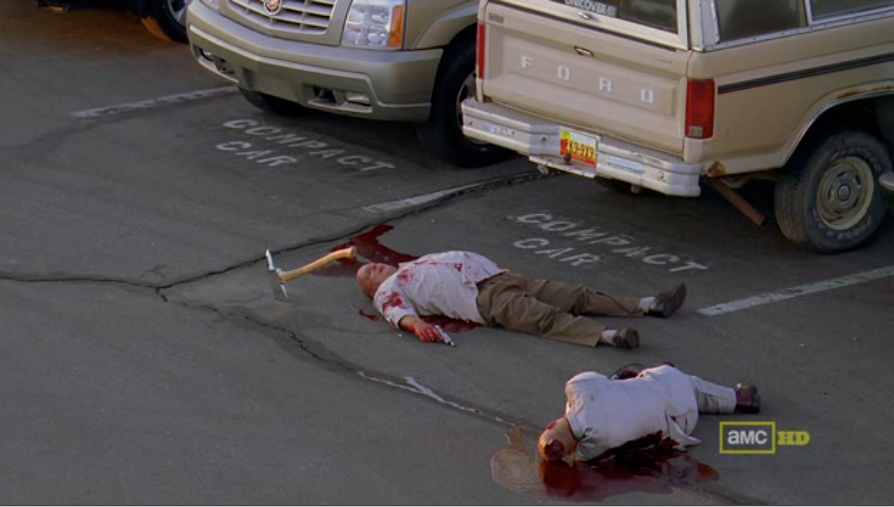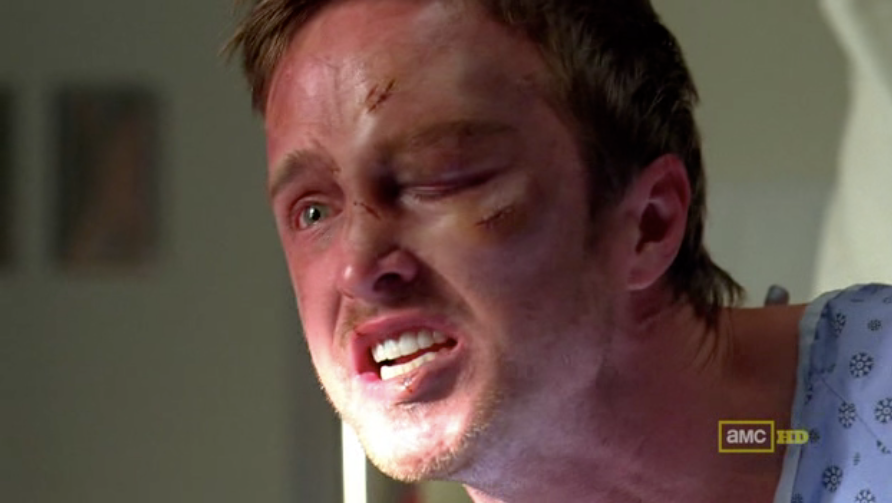BREAKING BAD - 3x07 "One Minute" - Episode Review
**Pardon me while I break format a bit, but this week’s stellar episode got me thinking about a television trope that’s become more and more apparent to me over the years, and I therefore wanted to pay tribute to it in the course of this review... **
Plot summary: Hank's increasing volatility forces a confrontation with Jesse and trouble at work. Skyler pressures Walt to make a deal. Gus' actions have severe consequences.
Written by Thomas Schnauz. Directed by Michelle MacLaren.
As television has come of age in recent years, so has the depth and variety of characters (and actors) that populate them. Like the movies, good characters are often the core of any story, and their archetypes, especially those of the “heroes”, stil remain rooted in traditional male gender ideas, especially when it comes to physical appearances. Being a child of the 70s, I was raised on certian “beefcake” heroes, granite-jawed, teutonic he-men who shot first and thought later. Those bad asses once ruled the big screen, but times change, and now the most “manly” of men are on the small screen, and all seem to share one common trait, a trait once identified as one of impotency and indecisivesness.
I’m talking about the bald bad ass, of course.
Thinking back over the shows I’ve loved over the years, I found it interesting to note that in most of them, the bald/balding (often white) man was invevitably my favorite character. These walking phallic symbols of male virlity and cocksureness are often audience favorites, and while usually second fiddle to their show’s main “hero”, provide the Hooah! moments everyone talks about as soon as the episode is over.

The modern era of the televison bald bad ass, of course, was defined by my online nom de plume, Vic Mackey. For seven seasons of THE SHIELD, Vic was our man’s Man: someone who kicked ass seven ways from Sunday, got all the women, had all the street smarts, and was completely, deliciously unrepentant in his badness. I recently watched the pilot episode of THE COMMISH and was struck by the 180 degree turn in characterization. When you saw that chrome dome a ‘comin, no one doubted his masculinity; in a final twist on his image, one of the more subtle aspects of the finale was that first shot of an emasculated Mackey in a suit one size too small -- no longer King Dick. Perhaps it was all overcompensation of a sorts, maybe if Vic had more hair, he’d be a kinder person...
Other baldys of personal note include Vern Schllinger (J.K. Simmons, OZ), although you could pick out half of that cast as well; Saul Tigh (Michael Hogan, BATTLESTAR GALACTICA), the tough as nails XO with the amazing acting eye; “Rocket” Romano (Paul McCrane, ER), before he lost his arm; Sgt. Doakes (Erik King, DEXTER), a serial killer’s wost enemy; John Locke (Terry O’Quinn, LOST) the once spiritual guru of the Island and now its worst enemy; Jean Luc Picard (Patrick Stewart, STAR TREK: TNG), the greatest Captain to ever command a Starhip; and Keith Mars (Enrico Collatni, VERONICA MARS).







And now to that mighty company we can add Dean Norris, of BREAKING BAD. “One Minute” was a tour de force for the actor and his character, as we got to see probably the worst few days in Hank Schader’s personal/professional life. Hank’s been in an emotional free fall since Tortuga’s head exploded, and after last week’s little RV mis-adventure, Hank did indeed smash, although I wasn’t expecting it that soon or that savagely. Actions have consequences, especially on BREAKNG BAD, and most of the show was devoted to the fallout from Jesse’s beating: regret, reciminations, confessions, and the “real” Hank revealing himself at last.
Once again, the cumulative weight of a multi-year show paid off in spades in this epsiode. At first, Hank was introduced as the stereotypical loutish macho law enforecement agent, all bluster, no bite. But as Season Two progressed, we got to see more and more shades to the man, as the show drew eerie parallels to his and Walt’s journies. Hank’s façade (and it is one, no doubt) and sense of self image has been stripped away and rechanged just as much as Walt’s has (and the irony is of course that it’s all because of Walt); and in some sense, the events of “One Minute” are a relief, as he no longer has to hide the torment he’s been underdoing by being forced to deal with it directly.
In that sense, his machismo's been fully turned against him (much like Vic Mackey's was in the end), and in the playing of this arc, Dean Norris has hit every note perfectly. Look at the scene where Marie tries to talk Hank into lying in front of the board; instead he comes clean to her with a direct, simple explanation of what he’s been been suffering through. Writers often get chided for making a character’s dialogue too on the nose, too obvious, but in this case, it's exactly what and how a man like that would say something like that.

And all of that brilliant character building came before the big assassination attempt, an insanely intense sequence that could have come right out of the NO COUNTRY FOR OLD MEN playbook, brilliantly staged and shot (the incessantly blaring car alarm was the perfect audio touch). Hank after all, is an “expendable” character, one who could potentally end the show as we know it, just as Doakes could have ended DEXTER back in Season Two. To be honest, I was tipped off to Hank’s attack (and probable survival) before watching the show, but that just made it even more intense 32 minutes, as I awaited the inevitable attack of the Cousins (every time those elevator doors opened, in fact). Hank lucked out in more ways than one, and it remains to be seen why Gus (or his fixer Mike) tipped him off. One thing's for sure though, Hank’s pursuit of Heisenberg isn’t going away any time soon, even if it has been curtailed for a bit.

On the other end of the beating lay a vengeful and hurting boy, and in his few brief scenes this week, Aaron Paul nearly stole the show away from Dean Norris with a ferociously vindictive, bed-ridden performance. His savage tirades against Hank and Walt (the true target of his ire) were astutely observed and affectingly played, bolstered by some uncomfortably realistic prosthetics. And even though Jesse took Walt up on his offer, once again those resentments aren’t going away any time soon (I imagine the truth about Jane will come out before series end, and may in fact be the impetus for Jesse turing informant on “Heisenberg”)
“One Minute” was enough to change the life of all the characters this week, and it was an episode that firing on all cylinders during every scene, something we’re not privliged to see very often on episodic tv. In fact, the last two episodes I saw that had this sort of unrelenting intensity were BATTLESTAR GALACTICA’s “The Oath” and SONS OF ANARCHY’s “Service”. Three classic series, three classic episodes, two classic bald bad asses.
Bravo.
Other notes:
• This was a fairly Walt-lite episode, but Cranston had several powerful moments nonetheless, including the shamed/guilty reaction he has during Jesse’s rant at him, and the cold-as-ice moment in which he told Skylar that Hank wasn’t family anymore.
Also, I noted a lot of GODFATHER-eque lighting influcences this week (think Vito’s office) as the characters discussed murder and reflected upon their sins in dark, light-slotted rooms.
• It’s been said before, but I noted (especially in the beat down scene), how much Dean Norris sounds like the late, great Sam Kinison when his blood’s up. You be the judge:
• The hillariously skeevy arms dealer was a nice touch of levity in an otherwise relentlessly grim show, and it became pretty obvivious that the Cousins were going to test out the merchandise on him. He’s lucky to have only had a few ribs broken by them…
• I watched this after an all-night painting session, so the fact that the opening sequence was in fact a flashback went right over my head. I just assumed (a) that was the Cartel dude who came up to visit Gus earlier in the season, and (b) that they still use phones that old down in Mexico. The lighting may have been a clue (I couldn’t make out a big difference on my copy; whereas a show like DAMAGES in particular really alters its cinematography to distinguishing past/future events), as was the wheelchair-like chair youner Tio was sitting in.
Regardless, my opinon of the old bastard has dropped even farther down the line, as he clearly fathered the Cousins and Tuco reprehensible life choices, along with god knows whom else. Interesting bit of exposition hidden in there that Gus is originally(?) from South America and may have some military ties.
Epsiode Grade: A